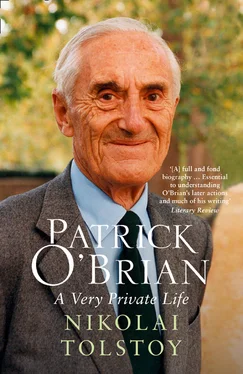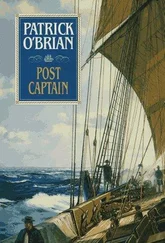Now, on the coast east of Malaga, they came upon Motril:
with its Moorish castle, perhaps the finest we have ever seen. And the backward view of Motril and the great headland beyond it, with the sky and the sea (lateen sails upon it) bluer than one can describe, with bits of the Sierra Nevada in the lefthand corner of the field of vision, that is a view, all right.
At Gibraltar they were briefly separated from Buddug, who was placed in quarantine in kennels at the end of the town. The friendly policeman who escorted them there also showed them HMS Vanguard lying in dock, and then took them to a pleasant hotel: ‘That evening we walked about until we were quite done up. It is an astonishing place: Spain still predominates, in spite of a very strong element of pre-war England with a dash of India.’
Unconscious seeds of Patrick’s future literary creations were being sown. He found Vanguard ‘very rosy and youthful’, admired the Georgian houses, and noted with approbation ‘Cheap Jack and Cheap John’s Stores’, together with Oxford marmalade.
While staying on the Rock, Patrick and my mother paid a brief visit to Tangiers. Crossing the strait, they saw dolphins, while ‘A kind mariner pointed out Cape Trafalgar.’ On disembarking, they found themselves in a world still more enticingly exotic than Spain: ‘We wandered up a street where everybody seemed to be going, a crowded street. But crowded with such people. Moors in djellabahs and slippers, pale Moors like Europeans but with fezzes, slim veiled women veiled [ sic ], blue or white …’
Delighted with their brief but memorable visit, they returned to be regaled by affectionate dolphins: ‘Not only did they skip and play, but they came right into the ship and swam immediately along the cutwater, having immense fun with the rush of the water. They kept pace effortlessly, turning, rolling, jostling one another.’
Details of these and other curious encounters are frequently accompanied by Patrick’s sketches in the margins of his journal. Back in Gibraltar they spent a whole afternoon searching for a birthday present for the growing Richard, before they eventually succeeded in hunting down a leather-cased shaving kit. At dusk they climbed the Rock to view the apes, and next morning set off for Cadiz – which regrettably proved ‘the rudest town so far, the ugliest and the dirtiest’. Patrick’s resolve to drink sherry at Jerez was frustrated, when a café could only provide him with ‘something just as good’. In fact the mysterious beverage proved ‘quite good’, while an awkward confrontation was narrowly avoided:
While we were drinking it up – precious little there was – I had my back to the street, facing M. She told me afterwards that all the time there were men, respectably dressed men, leering at her from behind my back, and making gestures of invitation. Perhaps it was as well that I did not see them, because I was feeling profoundly depressed and bloody-minded, and there would have been a scene.
After exploring the region around Malaga, they returned to Motril. By then they decided they had endured all they needed of Spain: ‘It is impossible to say how agreeable Collioure appeared in the sordid brutality of Motril.’
Patrick invariably grew restless and ill-at-ease when away from their snug home for long, but buoyed up by the prospect of return ‘we began to hope that we were mistaken and that the inland Andalusian was a decent creature’. A visit to the Alhambra aroused Patrick’s ‘surprise at the extraordinary good taste of the Spanish authorities’. Crossing the mountains en route for Cordoba, he enthused over the presence of a number of magnificent red kite, noting too that: ‘Here the little irises began all along the side of the road, on the hill leading out of Jaen, and for hundreds of miles after.’ Cordoba’s mosque ‘was utterly dull from outside … but inside – dear Lord, what grandeur’.
Even this splendour was eclipsed on their return to Seville:
We did see the Cathedral at once, and that was a glorious sight: it seemed to me profoundly religious, and very, very much more important than Córdoba. The severe, clean austerity of what we might call the furnishings was intensely gratifying. No geegaws at all, except Columbus’ tomb. (And that, being alone, was impressive too, in its way).
After a night in ‘the cheapest (and rudest)’ hotel in town, they revisited the cathedral, where Patrick observed the relics, including ‘a piece of Isidore’ (the seventh-century Spanish scholar), about whom he had intended to write when preparing his book of bestiaries before the War.
After obtaining paperwork from the Portuguese consul, they drove to Huelva and crossed into Portugal by boat across ‘the brown and yellow Guadiana, heaving gently, with tremendous rain beating down upon the mariners and dribbling through the hood’. On disembarking, ‘The rain stopped suddenly and a complete double rainbow stood on the Spanish side of the river: an omen, I trust.’
It appears to have been, for within hours they found Portugal more congenial than Spain:[fn1]
All the way we kept remarking the extraordinary difference the frontier had made – little ugly crudely painted houses, blood red and ochre or raw blue, perforated chimneys like cast iron stoves, ugly, barefoot people, intense cultivation, comparatively dull country, no Guardia Civil, no Franco Franco Franco (spontaneous enthusiasm in durable official paint), no rude staring, no excessive poverty. Even the gipsies … looked different: they had not that pariah air, and they wore skirts to the ground and wooden, heel-less slippers. But the greatest difference was at Lagos: not only was there no wild-beasting at all, but when we were walking on the sand we said good-day to some ordinary youths. They took off their caps and bowed.
In Lagos they were taken to watch the masquerade taking place in various clubs. So great was the crush, that they were obliged to hover in doorways. But Patrick found the masks ‘very funny indeed, almost all of them’. They learned that the clubs were graded according to social status: ‘The last was the top, and there, it is true, there were some solemn old gentlemen dancing with masked females. It was unbelievable that so many people should inhabit one small town, or rather village.’
That afternoon they paid their respects to one of England’s great naval victories, sitting in a shelter overlooking Cape St Vincent, an 800-foot cliff plunging sheer below them. On the way they passed a working windmill. Ever fascinated by technology of the past, Patrick stopped to photograph it. ‘The miller, a rough-looking but kind and sensible man, invited us in, and explained his mill, made us plunge our hands in the flour, moved the top, stopped the sails, and did everything he could to be agreeable – went to a great deal of trouble.’
Patrick sketched careful diagrams of the workings of the sails and internal machinery. During a digression to Faro he likewise drew some fishing boats, being particularly taken with the prophylactic eye (with splendid eyebrow) painted on each boat’s bow, a mysterious mop of wool adorning the prow.
The Portugal visited by Patrick appeared little changed since Wellington’s day. Patrick noted with pleased surprise: ‘No advertisement posters yet in Portugal. None at all.’ On the road to Lisbon:
As soon as we passed out of the Algarve the hideous man’s hat (black) worn over cotton scarf began to vanish – women here wear velour hat, flattened, with broad coloured ribbon or wide straw hat. Shoes rare – stockings cut at ankle for bare foot. Men in woollen stockings caps dangling to neck. Pleasant boy’s faces under black hats (bow behind).
Lisbon proved well up to expectation: ‘The sudden view of the Tagus with Lisbon the other side was as grand as anything I have ever seen.’ After strolling into the centre, ‘we wandered along the river and admired a square-rigged Portuguese naval training ship’. Amid the capital’s architectural glories, my mother was rewarded by a glimpse of ‘a windscreen wiper for sale called Little Bugger’.
Читать дальше












